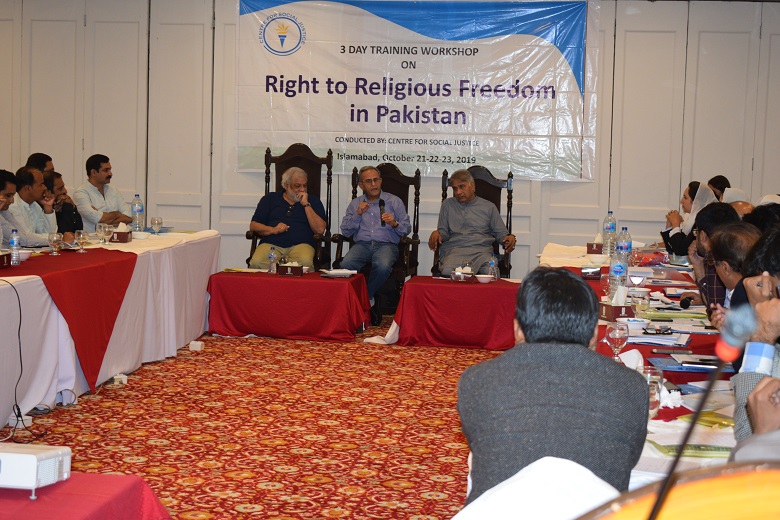ISLAMABAD, Pakistan: A three-day Training Workshop on “Right to Religious Freedom in Pakistan” held under the auspices of Centre for Social Justice (CSJ) and Peoples Commission for Minorities’ Rights (PCMR) concluded in Islamabad on Wednesday with a resolve to make concerted efforts for realization of religious freedom and other rights in Pakistan.
The thought leaders including Dr. Abdul Hameed Nayyar, Dr. Charles Amjad Ali, Dr. Afiya Zia, Saroop Ijaz, Zahra Syed Gillani and Amjad Nazeer and Peter Jacob, participated in the deliberations while Dr. Qibla Ayaz (Chairperson) Council of Islamic Ideology (CII), along with research team of the CII also joined a panel discussions.
Dr. Qibla Ayaz stated that the CII has recommended to the government that the orders of Supreme Court given on June 19, 2014 should be implemented in letter and spirit, moreover a portfolio of Ambassador at Large on the Right to Religious Freedom should be created to promote realization of this right in Pakistan and international relations.
A key proposals was about raising demand for a more inclusive second round of the Paigham-e-Pakistan, a process that entailed an out-right condemnation of religious extremism by over 1800 Muslim religious leaders in January 2018.
The CSJ/PCMR urged that the government should initiate a second Paigham-e-Pakistan process involving meaningful representation of religious minorities, women, professional bodies such as lawyers, doctors, intellectuals and civil society organizations, in order to chart out a way forward for more inclusive society, a prosperous and democratic Pakistan.
The moot deliberated on challenges in exercising religious freedom in the country, the problems of abuse of religion in the politics and law, forced conversions, etc. the biases and hate material in the textbooks, curriculum and education system as a whole. The attributes of social justice were dilated upon as a resolve to issues related to religious freedom.
The speakers emphasized that inclusion of religious minorities was imperative for building a tolerant, peaceful and cohesive Pakistan, hence all legislative, administrative and political measures, including the establishment of a National Commission for Minorities Rights was essential for integration of the religious minorities.
The participating lawyers, journalists, social activists and educationists from all provinces of Pakistan belonging to Christian, Hindu and Muslim faith background resolved to forge alliances for enforcement of the right of the citizens to free profession, practice and propagation of all religions under the constitution of Pakistan of 1973.
Peter Jacob, the Executive Director of the CSJ, Chairman of PCMR said that people of Pakistan have manifested an undying spirit for the enforcement of their constitutional and fundamental rights, their struggles and sacrifices need to be recognized and their demands accepted in the national interest of the country.
